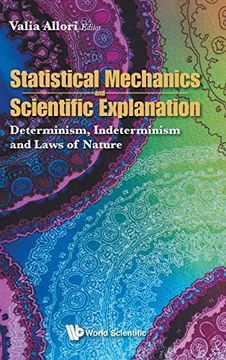Share
Statistical Mechanics and Scientific Explanation: Determinism, Indeterminism and Laws of Nature
Choose the list to add your product or create one New List
✓ Product added successfully to the Wishlist.
Go to My Wishlists
Origin: U.S.A.
(Import costs included in the price)
It will be shipped from our warehouse between
Monday, July 15 and
Monday, July 22.
You will receive it anywhere in United Kingdom between 1 and 3 business days after shipment.
Synopsis "Statistical Mechanics and Scientific Explanation: Determinism, Indeterminism and Laws of Nature"
The book explores several open questions in the philosophy and the foundations of statistical mechanics. Each chapter is written by a leading expert in philosophy of physics and/or mathematical physics. Here is a list of questions that are addressed in the book: Boltzmann showed how the phenomenological laws of thermodynamics, such as the second law of thermodynamics, can be suitably derived from statistical mechanics, which is based on classical mechanics. What exactly does this explanation amount to? Assuming that Boltzmann is able to explain the thermodynamic arrow of time connected with the second law, what about the psychological arrow? Many physicists use the notion of typicality instead of the one of probability when discussing statistical mechanics. What is typicality? What is its connection with probability? Is typicality explanatory? How can one extend Boltzmann's analysis to the quantum domain? Can indeterminism help or it does not play a fundamental role? How does this approach extend to theories in which gravity plays an important role? Boltzmann's explanation fundamentally involves cosmology: for the explanation to go through the Big Bang needs to have had extremely low entropy. Does the fact that the Big Bang was a low entropy state imply that it was, in some sense, "highly improbable" and requires an explanation? Are there approaches in which one can avoid postulating something like the past hypothesis? Statistical mechanics has two main formulations: one due to Boltzmann and the other due to Gibbs. What is the connection between the two formulations? Is one more fundamental than the other?
- 0% (0)
- 0% (0)
- 0% (0)
- 0% (0)
- 0% (0)
All books in our catalog are Original.
The book is written in English.
The binding of this edition is Hardcover.
✓ Producto agregado correctamente al carro, Ir a Pagar.

